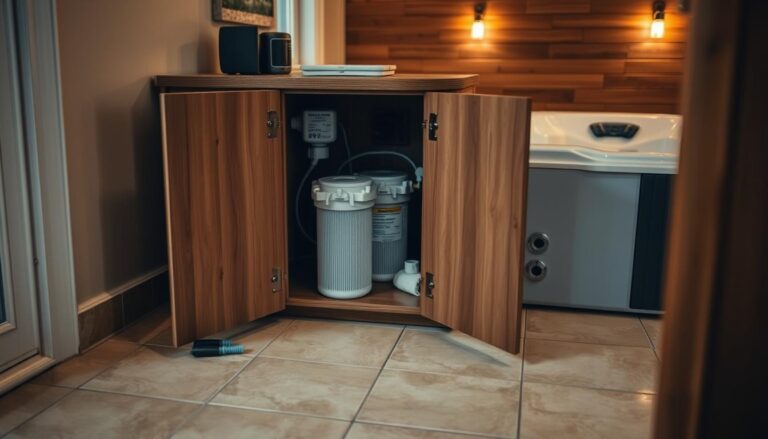How to Choose the Right Water Filter to Enhance Taste
Tired of bland water? Upgrade your hydration with the right water filter! Say goodbye to aftertastes and chlorine tang, and enjoy refreshing, delicious water with every sip. Ditch bottled water and discover the magic of perfect filtration for a delightful drinking experience. Join us on this journey to explore the art of water filtration and its incredible impact on your everyday hydration.
Key Takeaways:
- A water filter is a device that removes impurities from water, ensuring it’s safe for consumption.
- Water filters use physical and chemical processes to eliminate contaminants like chlorine, heavy metals, and organic matter, improving the taste and quality of water.
- Different types of water filters include activated carbon filters, reverse osmosis filters, ceramic filters, UV filters, and infrared filters, each targeting specific contaminants.
- Using a water filter offers additional benefits such as cost savings, reduced environmental impact, health benefits, and convenience of access to clean water.
What is a water filter?
A water filter is a device that removes impurities from water, ensuring that it is safe and clean for consumption. It acts as a barrier, trapping contaminants and allowing only clean water to pass through. Water filters can be installed in various locations, such as under the sink, on the faucet, or in a pitcher. They come in different types, each designed to target specific contaminants and improve the taste of water.
Water filters work through a combination of physical and chemical processes. They can remove sediment, chlorine, heavy metals, pesticides, and other harmful substances that may be present in tap water. By eliminating these impurities, water filters not only improve the taste but also enhance the overall quality of the water you consume.
Common water contaminants and their effects on taste
Tap water often contains various contaminants that can impact its taste. These include chlorine, sulfur compounds, minerals, and organic matter. Chlorine is commonly used to disinfect water, but it can leave behind an unpleasant taste and odor. Sulfur compounds, such as hydrogen sulfide, can give water a rotten egg smell and taste.
Minerals like iron, manganese, and calcium can also affect the taste of water. They can contribute to a metallic or bitter flavor. Additionally, organic matter, such as algae or decaying vegetation, can introduce earthy or musty tastes and odors.
The presence of these contaminants can make drinking water less enjoyable and discourage people from consuming an adequate amount. This is where water filters come in, as they are designed to target and remove these unwanted substances, resulting in cleaner and better-tasting water.
How water filters enhance the flavor of water
Water filters play a crucial role in enhancing the flavor of water. They remove impurities that can impart off-flavors, leaving you with a clean and refreshing taste. By eliminating chlorine, sulfur compounds, and other contaminants, water filters can transform tap water into a delicious beverage.
Chlorine, commonly used to kill bacteria and viruses in water treatment plants, can leave behind a harsh taste and smell. Water filters with activated carbon or carbon block technology are highly effective in reducing chlorine levels, resulting in water that is free from that unpleasant aftertaste.
Sulfur compounds, which can give water a foul odor and taste, can also be removed by certain water filters. These filters use activated carbon or specialized media to capture and neutralize sulfur compounds, resulting in odor-free and better-tasting water.
Water filters can also target minerals that can affect the taste of water. Some filters use ion exchange resin to reduce the levels of minerals like calcium and magnesium, resulting in water that tastes smoother and less bitter.
Overall, water filters act as a barrier between you and the impurities that can compromise the taste of your water. They provide you with a clean and refreshing drinking experience, ensuring that every sip is a delight to your taste buds.
Different types of water filters
There are several types of water filters available on the market, each with its own strengths and targeted contaminants. Understanding the different types can help you choose the right filter for your specific needs.
1. Activated Carbon Filters: These filters use activated carbon to adsorb impurities, such as chlorine, volatile organic compounds (VOCs), and some heavy metals. They are effective in improving taste and removing odors.
2. Reverse Osmosis (RO) Filters: RO filters use a semipermeable membrane to remove a wide range of contaminants, including bacteria, viruses, dissolved solids, and heavy metals. They are highly effective in improving water quality but may also remove minerals that contribute to taste.
3. Ceramic Filters: Ceramic filters are made from porous ceramic material that traps contaminants while allowing water to pass through. They can remove bacteria, sediment, and some larger particles. However, they may not be as effective in removing chemicals or dissolved solids.
4. UV Filters: UV filters use ultraviolet light to kill bacteria, viruses, and other microorganisms. They are often used in conjunction with other filters to provide additional disinfection.
5. Infrared Filters: Infrared filters use infrared rays to break down water molecules and remove impurities. They can improve taste and remove odors but may not be as effective in removing dissolved solids or heavy metals.
Choosing the right water filter depends on your specific needs and the quality of your water supply. It’s important to consider factors such as the type and concentration of contaminants, filter maintenance requirements, and the desired level of filtration.
Other benefits of using a water filter
In addition to enhancing the flavor of your water, using a water filter offers several other benefits:
1. Cost savings: Investing in a water filter can save you money in the long run. Instead of buying bottled water, which can be expensive and environmentally unfriendly, you can enjoy clean and delicious water straight from your tap.
2. Environmental impact: By using a water filter, you can reduce your carbon footprint and contribute to a greener planet. Disposable water bottles contribute to plastic waste, which is a major environmental concern. By opting for filtered tap water, you can help reduce the demand for bottled water and minimize plastic pollution.
3. Health benefits: Drinking filtered water can have positive effects on your health. By removing contaminants, water filters provide you with cleaner and safer water. This can reduce the risk of waterborne illnesses and improve your overall well-being.
4. Convenience: Having a water filter at home means you have access to clean water whenever you need it. You no longer have to rely on bottled water or worry about running out of supply. With a water filter, you can enjoy a constant flow of refreshing water at your convenience.
Conclusion
Transforming your water from bland to brilliant is as simple as investing in the right water filter. By removing impurities and enhancing the flavor, water filters allow you to enjoy clean, refreshing water straight from your tap. Say goodbye to the unpleasant taste of chlorine or sulfur compounds and embrace the natural, delicious taste of water. Not only will you save money and reduce your environmental impact, but you’ll also enjoy the numerous health benefits that come with drinking filtered water. So, why settle for dull, tasteless water when you can have a refreshing delight in every glass? Choose the right water filter and unlock the true potential of your H2O.







